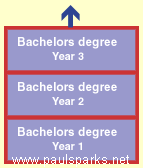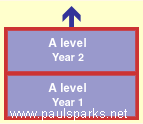|
Now Watch TV Online for free with my new site - TV4WEB.net
| | ||||||
Lesson Objectives
Lesson Activities
Secondary Education is from the age of 11. The qualification which students leave school with is the General Certificate in Secondary Education (GCSE). GCSE courses usually last for the last two years at school. You will normally be expected to have a GCSE (or equivalent qualification) in the subject(s) you wish to study at A-level (see next section, Further Education for "A levels") Scottish schools and colleges offer the Scottish Certificate of Education (SCE), where Standard grade is equivalent to the GCSE and the Higher grade examinations are taken after one year of additional study.
16 year old students choices:
Many students study for an Edexcel qualification instead of GCSE and A-levels. They award qualifications in subjects like Computer Studies, Business and Finance, Engineering, Catering and Travel and Tourism. The programmes combine theory and practice, giving students practical experience and not just writing about the subject. The Advanced Supplementary (AS) level exam is often taken by students from abroad as a way of meeting entry requirements for degree courses at British institutions. Two AS-levels are equivalent to one A level for degree course entry. Vocational Courses
Options for people aged 18
Options after Degree:
After completion of Masters Degree, the next course is a PHD (Doctors degree) - 1 Year - Full Time Most Masters courses and
PHD courses are designed to get the students prepared for the world of
work. They will involve mainly research, but may also involve some
Lectures (Lessons) and Tutorials (Discussion Lessons).    
There are some student grants available to cover some of the costs, but the number of places on grant assisted courses is very limited. Vocational courses are sometimes paid for by employers if the course is relevant to the job. University Flexibility University Facilities
Many Adults return to education in the UK in order to gain new skills. Therefore most university classes are a mix of all ages. There are also specific Adult training colleges in the UK. The University Campus Student Life Universities cater for all interests
Because the UK is a relatively small place everywhere is within travelling distance.
Most subjects within a course are taught over the one or two semesters. They may be integrated with other courses running at the same time or provide the basis for subsequent courses. Consequently, there is often less flexibility to choose different options in the early stage of the degree in contrast to the modular system used elsewhere in Europe and in the States. While options are an important part of most courses, these occur most commonly in the final year of the degree. Again, as our educational system is beginning to diversify, a number of institutions are moving to a truly modular system. Britain does lag behind many European countries in the proportion of young people in University Education. Selection for a University place is competitive with students' chances of admission being determined by their qualifications, the number of places available and the popularity of the course. As the number of students on a course is planned it is possible to ensure that there are sufficient facilities for each student. As students are selected for their ability to follow the course, the drop out rate is normally low and students are expected to attend all formal teaching periods. You are usually expected to enroll on specific course units very soon after your arrival. We do not follow the practice of students turning up to a large number of courses with the intention of narrowing down the choice after a few weeks. In most cases, the Tutor responsible for you will have already drawn up a suitable programme for you following advice from your home institution. If the department you are entering is participating in the European Credit Transfer System (ECTS) then you should already have had a Learning Agreement drawn up for you. Lectures can be given to quite large audiences, especially during the first year of a degree, or to quite small groups as in the case of student who attend specialised options in their final year. Students are not expected to ask questions in the middle of a lecture, especially if large numbers of students are involved, but many lecturers will invite questions at the end. While students are expected to go to all the lectures, this is not strictly policed. If a student does miss a lecture, they are advised to borrow a classmate's notes as textbooks can rapidly become out of date. Most students will undertake at least one major project which will generally be in the final year. The work will often be in one of the research laboratories and students normally choose, within the confines of the project, how much time to spend on it. It is not uncommon for final year students to spend too much time on their project as this is generally much more interesting than revising ! In some departments, students are asked to give formal presentations on the results of their projects. Seminars and Tutorials tend to vary considerably depending upon the department. Seminars involve the introduction of a particular subject, by either a Tutor or a guest speaker, which is then followed by questions and answers. Tutorials can involve small groups exploring areas in a more informal way and can include students being asked to undertake certain tasks. Larger tutorials may involve students working through question sheets with staff on hand to help with difficulties as they arise. Most courses will involve some form "continuous assessment" of students. This means that marks obtained for essays, projects and laboratory work during the year are taken into account when deciding the final mark for the course unit concerned. Work to be assessed must be submitted by the deadline given. In certain circumstances, extensions to the deadline may be given providing students give good reasons to the lecturer concerned before the deadline had passed. Oral examinations are
rarely used in British universities for undergraduate degrees except to
determine the final classification of a student's degree in cases of
doubt. Teaching how to think,
not what to think A personal approach to
learning Quality assured Summary of the UK
Educational System Following GCSE, students take two further years of study, following between two and four subjects (usually three). The number of subjects is small and the range of disciplines followed is generally narrow. It is common for example to take either all arts-based subjects or all science-based subjects. It is less common to mix them. Each subject is studied to a high level of specialisation and the coursework and the examinations involve a considerable amount of essay writing. At the end of this two-year period of study students take the examinations for the Advanced level of the General Certificate of Education (known as ‘A’ levels). Students in the United Kingdom have therefore normally had thirteen years of full-time education before entering university. This is one year more than most American high school students have on entering an American college. Admission to universities in the United Kingdom is competitive and around 35% of the age group normally expect to go on to higher education. Universities in Britain are autonomous bodies, empowered under their Charters or other acts of incorporation to award their own degrees. Undergraduate degrees in the United Kingdom normally take three years – one year less than most Bachelor degree schemes in the United States. City and Guilds Bachelors degree can be obtained after 3 years of education. In some cases it takes more time such as 6 years as in the case of medicine. Students who are not having the necessary qualification usually undergoes a foundation year. It involves formal lectures and seminar programs and the assessment is through examinations. At the successful completion of Bachelors students are awarded BA, BSc, etc according to the nature of their course. For securing admission you have apply through UCAS. Sandwich Bachelors incorporates industrial work experience for 3 to 12 months during their course work. Successful completion can be lead to direct admission to Masters. Postgraduate courses are usually taken once you already have an undergraduate degree. Taught masters degrees (MA, MBA, MSc) which may involve attendance at classes, followed by written exams, usually take one year. Research degrees (MPhil and PhD) involving independent research and the submission of a thesis, will take up to three years or more. PhD can be achieved by
three years full time study. The final thesis should satisfy the length,
depth, originality and significance as required. PhD is the highest award
conferred by the university. It is a research degree and the candidates
have to submit a thesis of their work. Minimum duration for this award is
3 years though relaxed timeframe is possible in some extraordinary cases. Click Here to Return to Top of Page |
||||||||
© Copyright by Paul Sparks, 2001-2008